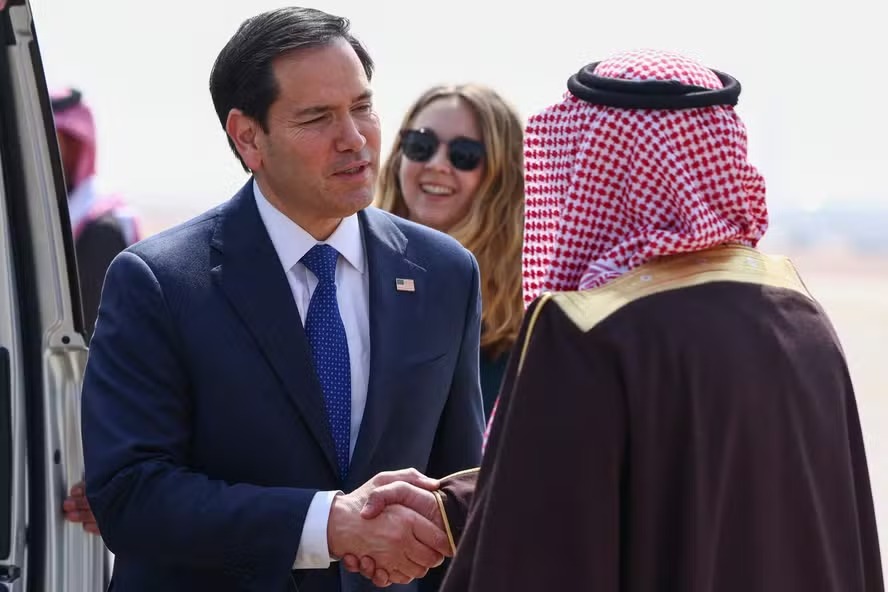
Published 17/02/2025 11:17 | Edited 17/02/2025 11:18
Diplomats from the United States and Russia gather on Tuesday (18) in Riyadh, Saudi Arabia, to discuss a possible peace agreement in Ukraine. The initiative, conducted by the Trump government without the participation of the European Union or the Ukrainian government itself, has generated a strong reaction in Kiev and restlessness among European allies.
The meeting takes place after a connection between Donald Trump and Vladimir Putin last Wednesday (12), in which the US President expressed interest in accelerating a ceasefire. The meeting also represents a milestone in relations between the two countries, being one of the first high -level face -to -face meetings between Washington and Moscow since the beginning of the war.
The choice of Saudi Arabia as the headquarters of the negotiation reinforces the role of mediation of heir prince Mohammed Bin Salman, who has already facilitated prisoners’ exchanges between Russia and Ukraine in the past. The Saudi government has been positioned as a neutral actor in the conflict, but its proximity to both Moscow and Washington raises questions about its impartiality.
The US delegation will be led by Secretary of State Marco Rubio, accompanied by National Security Counselor Mike Waltz and the special envoy Steve Witkoff. On the Russian side, will participate in Chancellor Sergey Lavrov and presidential advisor Yuri Ushakov. Among the main topics on the agenda are the possibility of an immediate ceasefire, the maintenance of Russian forces in occupied territories and Moscow’s requirement for Ukraine to abandon its NATO membership ambitions.
The absence of the European Union in the peace process has been a cause for criticism within the bloc, but for Russia, its participation is irrelevant. Russian Chancellor Sergey Lavrov stated that “he does not know what Europe has to do at the negotiating table about Ukraine,” implying that Europeans would not be interested in a real deal, but in maintaining conflict.
Speech reflects the block’s isolation on these negotiations, while European leaders try to reorganize their strategy to ensure their interests are considered.
Europe summons emergency meeting
Faced with US movement, European leaders have called for an emergency meeting in Paris to discuss a common response and prevent the continent from being excluded from negotiations. The meeting will be attended by France, Germany, the United Kingdom, Italy, Spain, Poland, the Netherlands and Denmark, as well as the European Commission and NATO.
European seizure is due to the fact that the negotiation, led by Washington, may result in territorial concessions to Russia without guarantees for regional security. French President Emmanuel Macron emphasized that Europe will not accept an agreement that ignores his interests and those of Kiev. “This war is not just Ukraine, but the security of all over Europe,” said European Council, António Costa.
In addition to fearing an unfavorable agreement, Europeans face internal dilemmas on how to respond to the new scenario. The United Kingdom and Sweden have already expressed the willingness to send peace troops to Ukraine if a ceasefire is established, increasing the risk of direct confrontation with Russia.
However, there are disagreements within the EU. While countries like France and Poland defend a more active role in Ukrainian security, Germany hesitates to support measures that may increase military climbing. German Chancellor Olaf Scholz warned that any European military presence in Ukraine would need to be carefully negotiated.
The change in US posture also rekindles discussions about European security. With the gradual withdrawal of US military support, continent leaders evaluate accelerating initiatives to strengthen their own defense. Macron has advocated the creation of a European army, but the lack of consensus among the bloc countries still makes it difficult to make concrete advances.
Territorial losses and pressure on Kiev
Russia currently controls about 20% of the Ukrainian territory, including the regions of Donetsk, Lugansk, Kherson and Zaporizehzia, as well as Crimea, attached in 2014. US press information indicates that Trump would be willing to press Ukraine to accept to accept definitive loss of these areas as part of a ceasefire.
Moscow, in turn, rejects any return of territory and insists that Ukraine abandon its ambitions to integrate NATO. Russian Chancellor Sergey Lavrov stated that negotiations should consolidate the new geopolitical reality, with no space for revisions. “Ukraine and the West need to accept that the map of the region has changed,” Lavrov said.
Zelensky denounces exclusion and seeking international support
The Ukrainian government criticized Kiev’s absence in negotiations and said any decision made without his participation will be unacceptable. President Volodymyr Zelensky stressed that he will not accept the US and Russian agreements and warned that Ukraine’s isolation in the diplomatic process could weaken his position.
“The fate of Ukraine cannot be decided without the Ukrainians,” said Zelensky, who seeks international support to reverse the situation. The president also intensified diplomatic contacts, planning meetings with European leaders to ensure that the country is not overlooked.
Other implications and the future of US-Russian relations
Riyadh negotiations also raise other geopolitical issues. The US government would be considering the presence of peace troops from non-European countries, including Brazil and China, to ensure a possible ceasefire. Kremlin, however, rejects any proposal without its endorsement and insists that Ukraine safety must be managed with Russian guarantees.
In addition, the approach between Trump and Putin can mark the beginning of the normalization of relations between the two countries, altering the dynamics of economic sanctions and western foreign policy. The US decision to negotiate directly with Moscow weakens the diplomatic isolation imposed on Russia since 2022 and signals a new phase in international relations.
While Washington and Moscow advance in negotiations without the participation of Kiev and the European Union, Ukraine faces the risk of seeing its demands ignored in an agreement that favors Russia. The European reaction is still uncertain, but the scenario highlights a new configuration of forces in global geopolitics, with Europe trying to redefine its role in the face of US isolationist posture and strengthening the Russian position.
Source: vermelho.org.br

